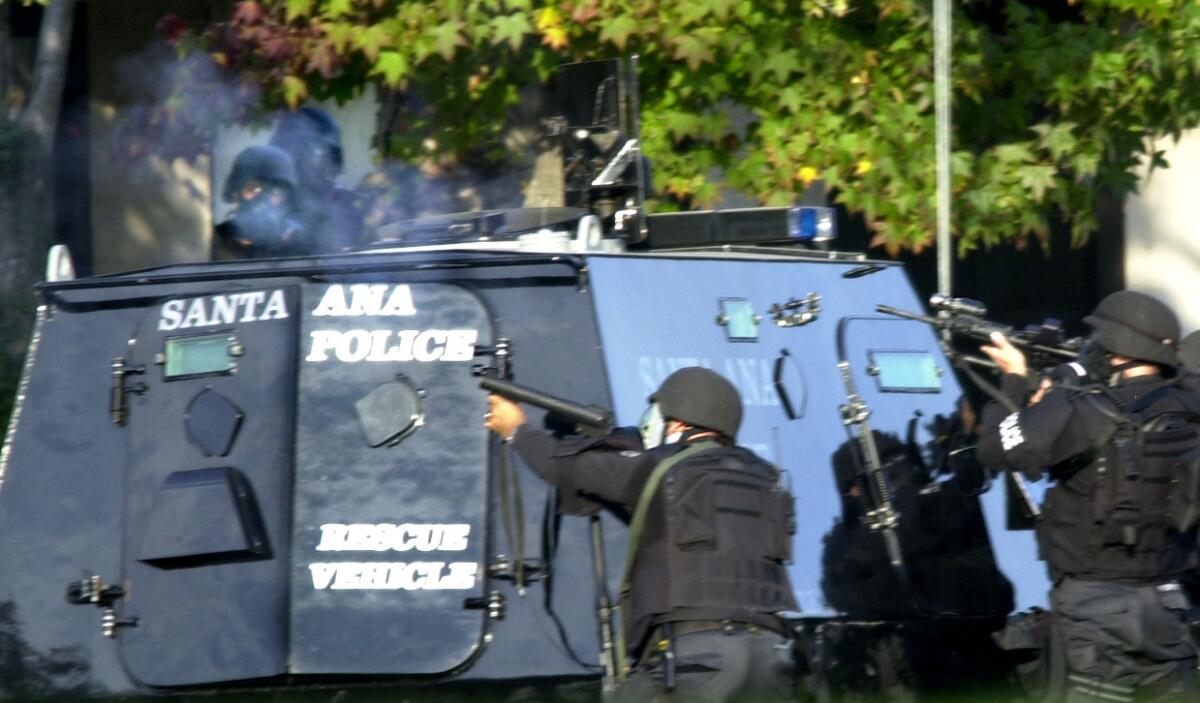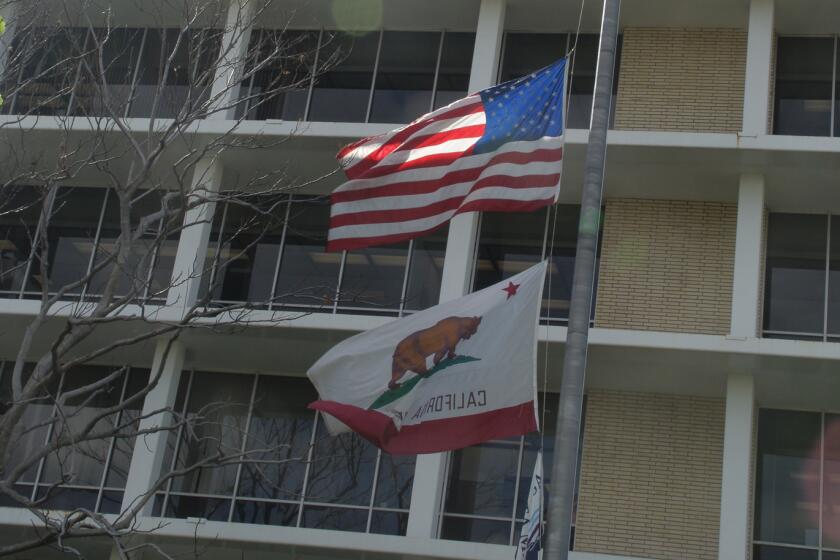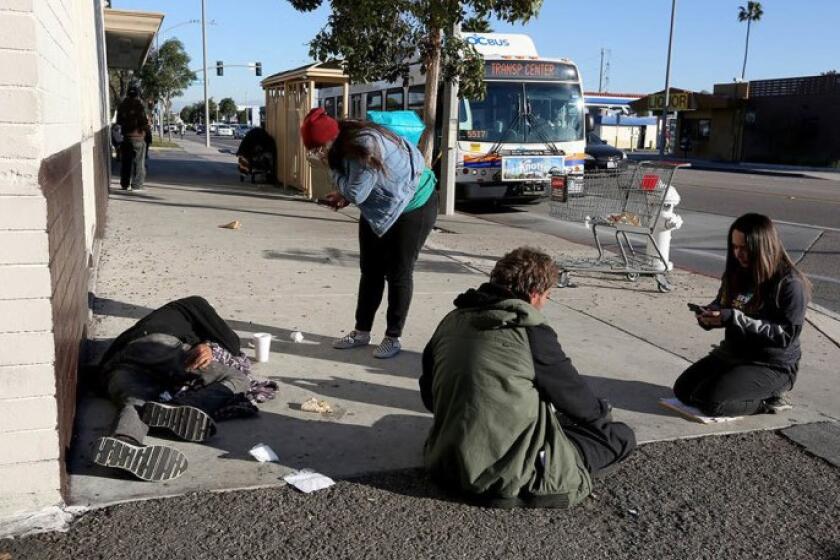Santa Ana hosts forum on civilian police oversight

- Share via
As the Santa Ana City Council considers creating a police oversight commission, the city held a virtual forum on Wednesday night to hear from a panel of experts and field questions from the public.
The city is trying to determine what specific model and what kind of authority its police commission should have. It’s been encouraging residents to fill out a survey on its website to gauge public opinion on police oversight.
City staff will compile the findings of the survey and results of the forum into a report and present it to the City Council next month.
The panelists at the virtual event included John Alden, the executive director of the Oakland Community Police Review Agency, Tiffany Bailey of the American Civil Liberties Union, George Lippman, a former member of the Berkeley Police Review Commission, Eileen Teichert, chair of the Riverside Community Police Review Commission and Michael Gennaco, an independent auditor for the Anaheim Police Review Board.
“I think the way that oversight fits in with law enforcement today is it is an essential feedback loop for any city to figure out whether or not their police officers really are policing in a way that’s consistent with community expectations,” Alden said. “Civilian oversight ... gives the community a very direct way to have input over individual complaints about police misconduct, about patterns of police behavior ... and even through changing police department policies, which could be written behind closed doors without any public input. And these three powers I think can really dramatically alter the way that police behave.”
Bailey said that forming a police oversight commission is the first step in fostering a transparent and accountable police department. However, it will only work if the commission’s model is strong.
“Meaning that it has independent investigation authority, subpoena power and all these other tools that make civilian oversight particularly effective,” she said.
In another survey that the city used to initially glean community input on police oversight, respondents listed top priorities for the proposed commission to be transparency, community outreach, use of statistical pattern analysis, open communication with the police department, independence, access to public records, increased resources, increased protection for peace officer rights and support for government and elected officials.
A debate over whether planning commissioners should live within the voting districts they represent — and be registered U.S. voters to serve — split council members Tuesday.
At the forum, the experts described the various operations of their commissions.
Alden said the Oakland police review agency has the power to investigate every civilian complaint about police officer misconduct, though budgetary restraints require that they prioritize investigations. He also said that the commission has “unfettered” access to police records, which is helpful when trying to figure out if an officer has a pattern of misconduct. Teichert said the Riverside commission has the power to subpoena for police records.
Gennaco said it’s important for a civilian police oversight commission to have the assistance of a professional who understands law enforcement.
“In my view, a review board without a professional, without some sort of independent assistance and expertise, is going to be largely at sea, because policing is a very complicated operation,” he said. “There’s so much to learn that even individuals of goodwill are not going to be able to get up to speed in order to accomplish the objectives here. And I think that assistance of an independent third party, I think is crucial.”
Anaheim has the only civilian police review board in Orange County. It’s comprised of seven residents, but the city also contracts with Gennaco’s Office of Investigative Review Group, which is given access to confidential files to provide investigations and reports on the police department.
Bailey said Oakland’s police commission is the most desirable because it touches on all the components needed for effective oversight.
“An Oakland model that allows folks to be very involved in discipline is particularly powerful. It means that it’s just not a rubber stamp or just a review of the investigation, but the community is actively engaged in what’s going on,” she said. “Also, similarly the unfettered access to police records and ability to review exactly what is going on in the department to ensure that the board is getting the information that it needs to really look at the issue and provide a fair and unbiased kind of recommendation ... And then also the ability to change policy, for it to not only be advisory, but to recommend it in some circumstances.”
The City Council first brought up police oversight in June 2020, a few weeks after the police killing of George Floyd sparked a nationwide reckoning with police brutality. In December, city staff presented the council with information on three models of civilian police oversight commissions: investigation-focused, review-focused and auditor/monitor models.
In an effort to fix social and health inequities revealed and worsened by the COVID-19 pandemic, a local nonprofit has partnered with Orange County to develop a map equity tool that shows which cities and neighborhoods are the most in need.
The investigation-focused model relies on independent investigations of complaints against officers, while review-focused models center around commentary on completed investigations and making recommendations to police executives.
The auditor/monitor model aims to instill change by making recommendations to police departments after reviews of police policies, practices or training. This model examines how the department deals with complaints investigations, including the quality of the investigations, findings and whatever discipline was given.
Most council members were supportive of either an investigation-focused commission, an auditor/monitor model or a hybrid of the two.
Councilwoman Jessie Lopez proposed a model similar to Oakland’s, which has the power to fire and hire a new chief. Mayor Vicente Sarmiento favored the Riverside model.
Councilman Johnathan Hernandez mentioned at the December meeting that he would like to have people on the commission who have been through the justice system.
“As this country is facing and as we’ve seen some very adverse police misconduct all throughout the country, I think it’s necessary to have an ideological shift in the inclusivity of the criminal justice system,” Hernandez said.
During the question and answer section of the oversight forum, a member of the public asked the experts whether people could be on a commission if they had a criminal background.
Alden said that the city of Oakland encourages people with criminal backgrounds to apply for the commission. Teichert said people are not qualified if they are guilty of a felony. She said the city of Santa Ana should be careful to not “inadvertently exclude people that [it doesn’t] want to exclude.”
All the latest on Orange County from Orange County.
Get our free TimesOC newsletter.
You may occasionally receive promotional content from the Daily Pilot.





